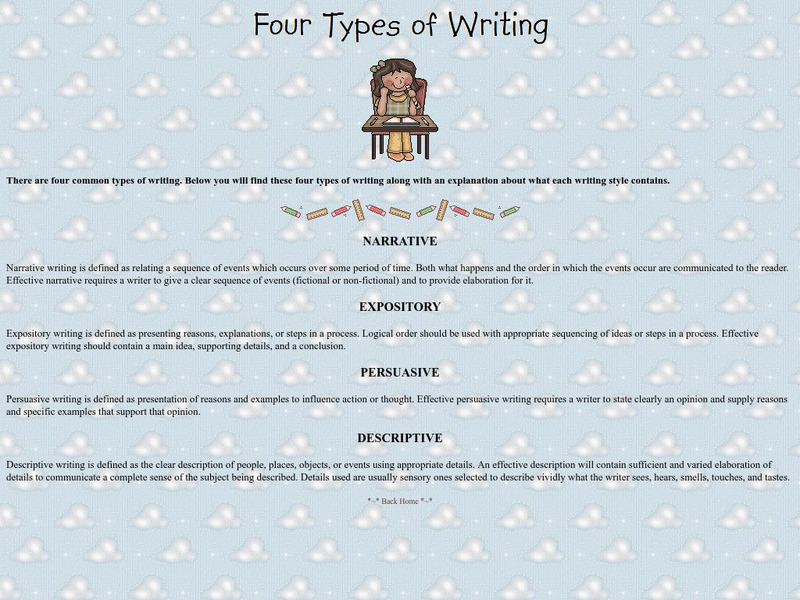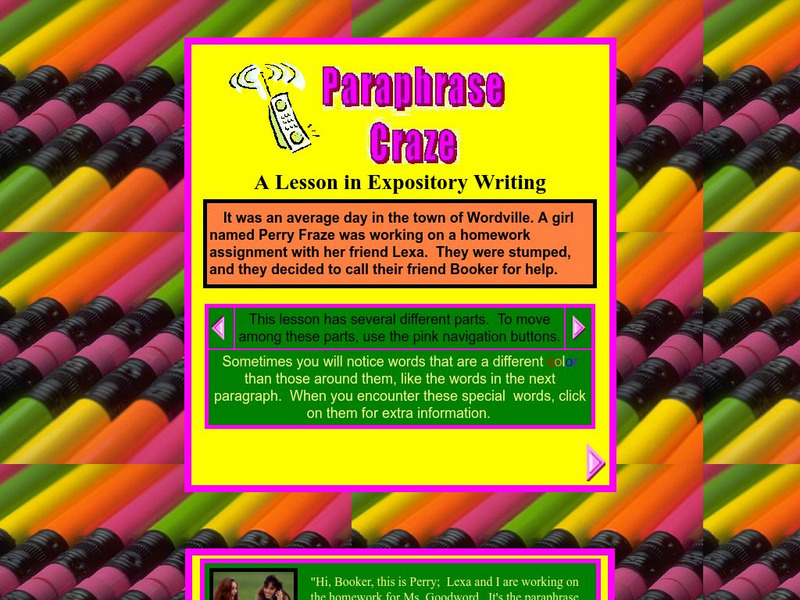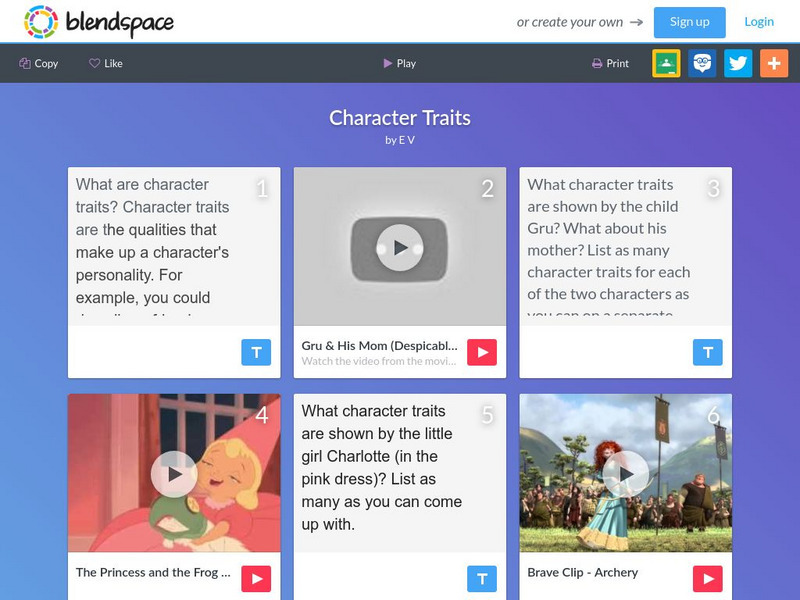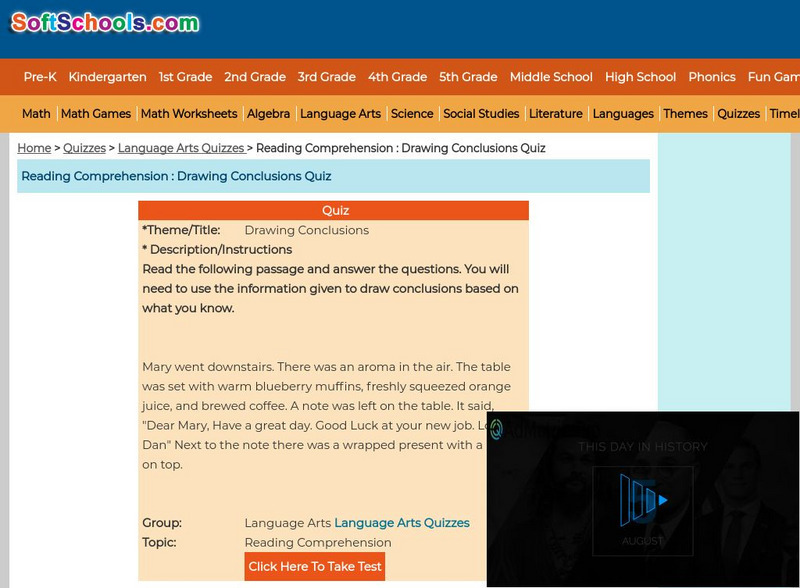Other
Ccss Literacy E Handbook: Informational Text: Compare Perspectives
A short explanation of the difference between a firsthand account and a secondhand account.
Other
Sanchezclass.com: Four Types of Writing
Definitions of the four types of writing: narrative, expository, persuasive, and descriptive.
Other
Hickman Community Charter District: Informative Writing
Sample topics in informative writing for K-3rd grades and 4th-8th grades. CSS.ELA-Literacy.CCRA.W.2. CCSS.ELA-Literacy.WHST.6-8.9 Draw evidence from informational texts to support analysis, reflection, and research.
Other
Cyberwriter: Descriptive Writing
Resource gives writing activities leveled K-1st grade, 2nd & 3rd grades and 4th through 8th grades.
Curated OER
Mc Graw Hill: Informational Text: Compare Text Structures
This learning module focuses on comparing organizational patterns in informational texts including chronological order, compare and contrast, cause and effect, and problem and solutions. Click on each text structure for an explanation.
Beacon Learning Center
Beacon Learning Center: Paraphrase Craze: A Lesson in Expository Writing
This tutorial focuses on how to paraphrase using an excerpt from Poe's short story, "The Tell-Tale Heart." It defines paraphrase and plagiarism, presents examples, and explains what is incorrect about them. It is interactive asking for...
Better Lesson
Better Lesson: Unit: Informational Text: Writing
This unit is designed to teach students about research writing. The lessons follow the format of Writer's Workshop. Many of the lessons provide a formula for students to follow while constructing their essays to ensure struggling readers...
TES Global
Blendspace: Ela: Character Traits
Four video clips followed by questions to help students learn to identify character traits in literary texts.
TES Global
Blendspace: Expository Writing
A twelve-part learning module with links to images, texts, slides, a video, and a quiz about expository writing, text structures, conjunctive adverbs, and more.
TES Global
Blendspace: Grammar Pre Learner Week 1 Paragraphing
A six-part learning module with links to images, videos, and websites about writing a paragraph.
TES Global
Blendspace: Expository Essay
A six-part learning module with links to videos, websites, and texts on writing expository essays.
Other
Prezi: Summarizing a Text
Slideshow provides an explanation of summarizing and describes how to make a good one.
ClassFlow
Class Flow: Paragraph Structure
[Free Registration/Login Required] This lesson was designed to help students to analyze how individual paragraphs are structured in writing.
ClassFlow
Class Flow: Paragraphs
[Free Registration/Login Required] Students will write simple, non-chronological reports from known information (e.g., from own experience or from existing text), using notes made to organize and present ideas. Students will learn to...
ClassFlow
Class Flow: Topic Sentences
[Free Registration/Login Required] This flipchart defines and gives examples of a topic sentence. Through an Activote activity students identify the topic sentence for various paragraphs.
Soft Schools
Soft Schools: Drawing Conclusions
Read a literary text paragraph and then answer questions that require the reader to draw conclusions from the text in this nine-question quiz.
ClassFlow
Class Flow: Using Specific Detail
[Free Registration/Login Required] This elementary flipchart promotes creative writing using supportive details. Students will explore examples from literature and consider ways to improve their writing.
ClassFlow
Class Flow: What a Character
[Free Registration/Login Required] This flipchart discusses ways that authors reveal character traits. Students learn to find examples in the literature to demonstrate that character traits. A sample assessment, graphic organizer and web...
ClassFlow
Class Flow: Writing Showing Feelings
[Free Registration/Login Required] This elementary flipchart shows how writers express feelings. Instead of telling the reader, they show the reader through descriptive writing.
ClassFlow
Class Flow: Writing a Report or Essay
[Free Registration/Login Required] This flipchart is intended for grades 3-5 and outlines the steps in writing a report or essay.
ClassFlow
Class Flow: Can You Tell?
[Free Registration/Login Required] This flipchart helps students to determine the difference between narrative and expository writing.
ClassFlow
Class Flow: Grammar Paragraph
[Free Registration/Login Required] The Objective of this flipchart is to help students to begin to organize stories into paragraphs; and to begin to use paragraphing in presentation of dialogue in stories.
ClassFlow
Class Flow: Paragraphs
[Free Registration/Login Required] Students will begin to organize stories into paragraphs, and use paragraphs in presentation of dialogue in stories. Reviews what a paragraph is and uses Humpty Dumpty as an example.
ClassFlow
Class Flow: Writing With Pizzazz Word Choice
[Free Registration/Login Required] This flipchart reviews ways that students can create more meaningful writing by choosing words carefully. Links to online thesaurus and opportunities to evaluate and create sentences are included.
























